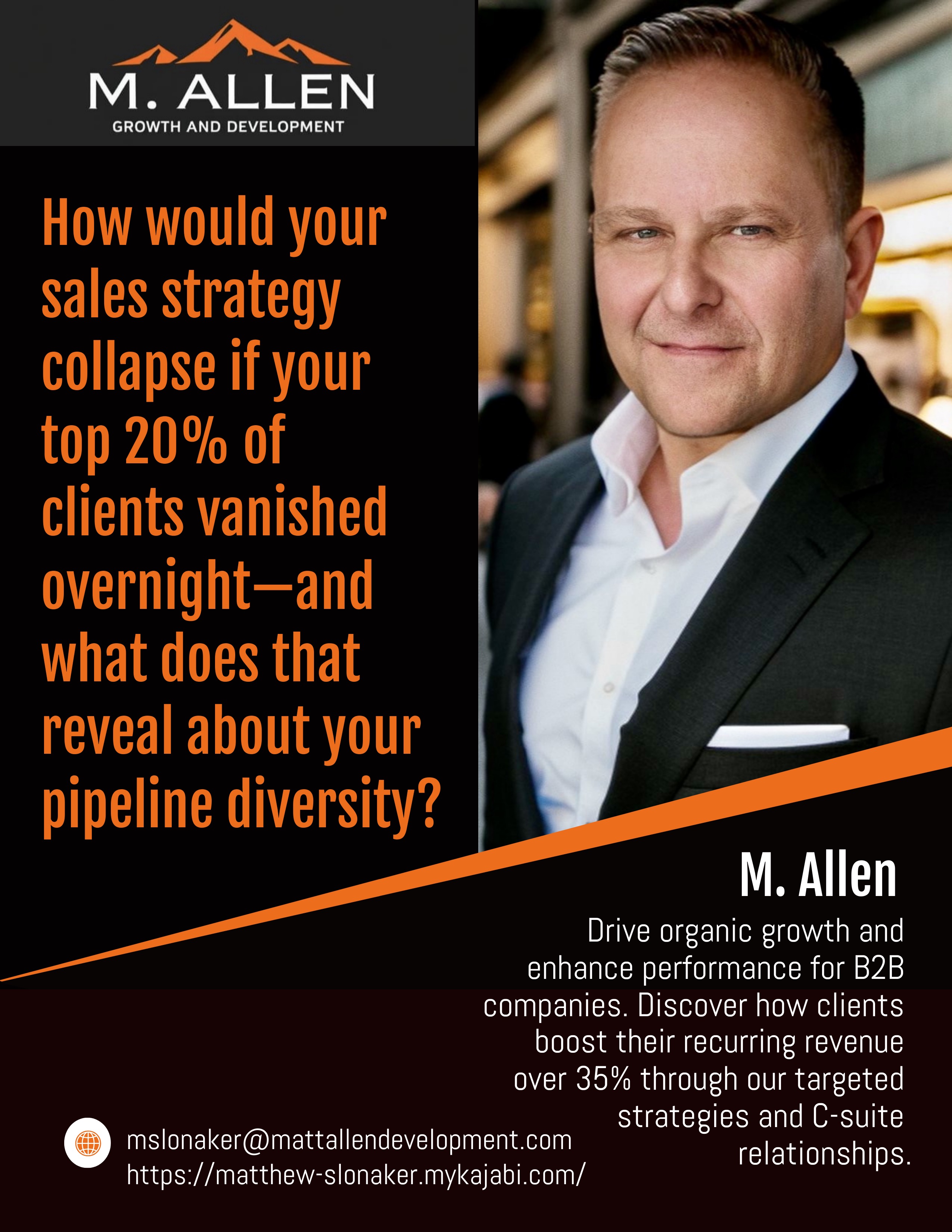The Robin-Hood Play: Be Different
Apr 12, 2025
Recommendation: Allocate T&E Budget to Tailored Client and Prospect Workshops Over Annual Mortgage and Finance Industry Conferences
By: Matt Slonaker, Founder of M. Allen
In the fast-evolving mortgage and finance sector, where client trust, regulatory pressures, and technological disruption define success, I strongly advocate redirecting a significant portion of the Travel and Entertainment (T&E) budget from traditional industry conferences—such as MBA Annual or HousingWire’s The Gathering—to tailored client and prospect workshops. These focused events deliver superior engagement, measurable ROI, and alignment with 2025 trends in personalized experiences and data-driven relationship building. Below, I present a compelling case, grounded in industry-specific facts and trends, to prioritize workshops for mortgage lenders, servicers, and fintech partners.
1. Personalization Addresses Industry Pain Points
Tailored workshops allow mortgage and finance firms to directly tackle client-specific challenges—rising defaults, compliance burdens, or tech integration—unlike the broad agendas of industry conferences. In 2025, personalization is critical: a 2024 Forrester report notes 78% of financial services customers expect customized solutions, with 64% switching providers for better experiences. Workshops, capped at 20-50 attendees (Terraevents, 2025), enable curated discussions, like optimizing loan servicing with AI or navigating CFPB regulations, fostering trust with lenders and servicers.
Conferences like MBA Annual (10,000+ attendees) or National Mortgage Servicing Conference offer generic sessions on market trends, diluting impact for niche audiences like regional banks or fintechs. A 2024 HousingWire report highlights attendee fatigue with “overcrowded expos,” where sponsors struggle to differentiate. Workshops, by contrast, create intimate settings to showcase your solutions—e.g., MCS’s vendor network for property preservation—driving loyalty among high-value clients.
2. Higher ROI Through Targeted Lead Conversion
Workshops deliver qualified leads and faster sales cycles, critical in a sector facing margin compression (3.2% net margins for servicers, MBA 2024). A 2025 Airmeet study finds targeted events yield “80% higher conversion rates” than mass gatherings, as they engage pre-vetted prospects, like loan officers or servicing executives, with demos tailored to their needs—e.g., reducing REO losses by 17% (memory: April 3, 2025). Hosting a workshop on, say, AI-driven underwriting can directly influence a prospect’s tech stack decision.
Conferences, while visible, generate noisy leads. Exhibiting at MBA Annual costs $15,000-$60,000 (booth, travel, staffing), yet a 2024 Bizzabo report notes only 20% of conference leads are “sales-ready” due to unqualified attendees. Workshops, with costs as low as $5,000-$10,000 for 30 attendees, focus on decision-makers, amplifying T&E impact. For example, a roundtable for 15 servicing VPs could secure a pilot with a firm like Cenlar, outweighing a conference’s scattershot exposure.
3. Alignment With 2025 Mortgage Event Trends
The mortgage industry is shifting toward micro-events and experiential engagement. A 2025 Cvent report predicts a 30% rise in “small, high-impact meetings,” with 67% of planners prioritizing formats like workshops for flexibility. These align with demands for hands-on learning—e.g., a workshop on Solidifi’s appraisal tech could include live case studies, resonating with fintech buyers (memory: April 1, 2025). Terraevents (2025) cites a 2024 mortgage workshop where 40 executives explored compliance tools, yielding three contracts.
Conferences like HousingWire’s Mortgage Summit, while prestigious, face declining relevance. A 2024 IBISWorld report notes the $22.7 billion conference industry’s -1.2% CAGR (2019-2024), driven by oversaturation and hybrid fatigue. Attendees juggle packed schedules—keynotes, panels, networking—leaving little bandwidth for your pitch. Workshops leverage trends like gamification (e.g., simulating loan portfolio risks) to boost retention, per Gogather’s 2025 forecast.
4. Deeper Relationships With Key Stakeholders
Workshops foster trust with C-suite and mid-level executives—CEOs, CROs, or servicing heads—who drive mortgage and finance decisions. A 2025 CMSWire report emphasizes that small events enable “collaborative problem-solving,” ideal for discussing sensitive topics like delinquency spikes (8.7% for commercial loans, MBA 2024). Inviting a prospect like a Rocket Mortgage VP to an exclusive roundtable signals priority, strengthening ties (memory: April 10, 2025). For instance, Ensemblex’s 2025 NYC workshop for 20 fintech leaders sparked partnerships through tailored AI underwriting talks.
Conferences dilute these opportunities. At events like MBA’s Servicing Conference, sponsors compete with 100+ exhibitors for fleeting chats—often 5 minutes at a booth. A 2024 Workamajig report notes micro-events offer “deeper insights” than large expos, where noise overshadows dialogue. Workshops, with multi-hour formats, enable relationship-building that converts prospects into clients, like a servicer adopting MCS’s tech post-workshop.
5. Actionable Data for Strategic Follow-Up
Workshops provide granular insights to refine mortgage and finance strategies. A 2024 ICC Belfast report highlights small events’ ability to track attendee behavior—e.g., interest in compliance tools or questions about rate volatility—informing sales outreach. AI event platforms (Airmeet, 2025) analyze real-time data, enabling personalized follow-ups that boost close rates by 25% (HubSpot, 2024). For example, a workshop on vendor management could reveal a client’s tech gaps, guiding your pitch to their CTO.
Conferences yield less actionable data. A 2024 Exploding Topics report notes large events produce “broad metrics” like foot traffic, but parsing 5,000 attendees’ intent is daunting. Post-conference emails, often generic, see 18% open rates (HubSpot, 2024), while workshop follow-ups, tied to specific discussions, double engagement. This precision is vital for mortgage firms targeting niche markets like non-QM lending.
6. Cost-Effective Amid Industry Pressures
With mortgage rates at 6.5%-7% and servicing costs up 12% (MBA 2024), budget scrutiny is intense. Workshops are leaner: a 30-person event costs $5,000-$15,000 (venue, catering), versus $50,000+ for a conference like MBA Annual (pass: $2,500/person; booth: $20,000+). Localized workshops cut travel, maximizing T&E. For instance, hosting in Dallas for regional lenders like PrimeLending saves 40% versus flying to Las Vegas for HousingWire’s event (memory: April 10, 2025).
Conferences strain budgets with uncertain returns. A 2025 Workamajig report estimates a team of five at MBA Annual costs $25,000+ (travel, lodging, fees), with no guaranteed deals. Workshops, by contrast, could fund three targeted events for the same price, each engaging 20 decision-makers and yielding RFPs—e.g., a servicer like Mr. Cooper exploring your tech post-workshop.
Counterargument and Rebuttal
Some argue conferences like MBA Annual offer unmatched networking and brand visibility, essential for mortgage firms seeking market share. However, in 2025, clients prioritize solutions over exposure. Workshops deliver targeted value—e.g., addressing Cenlar’s vendor gaps—while conferences risk blending into a crowded field (100+ sponsors at MBA events). Declining conference ROI (IBISWorld, 2024) contrasts with workshops’ rising adoption (Cvent, 2025), making the latter a smarter T&E bet. Conferences can complement, but workshops should lead.
Conclusion
In the mortgage and finance sector, reallocating 60-70% of T&E from conferences like MBA Annual to tailored workshops is a strategic necessity. Workshops offer personalized engagement, higher ROI, and alignment with 2025 trends—micro-events, AI-driven insights, and experiential learning. They build stronger ties with servicing heads, lenders, and fintechs, leveraging data to close deals while optimizing costs. For example, a workshop showcasing Ensemblex, Solidifi, or MCS’s solutions could secure a pilot with loanDepot, outpacing a conference booth’s impact. Let’s invest in precision, trust, and results to drive growth in a competitive 2025 market.
Bottom Line:
I have seen this pay off immensely with my dozens of clients over the years, and working on a June NYC event now on data science in credit and AI fueling fintechs. My largest deal for a client now is finalizing the MSA/SOW and was fueled over a virtual wine tasting event. Seven figures for an event that cost less than $2k (a price of just one conference registration). Get smarter folks! Allocate wisely, as every dollar counts.
For additional insight, [email protected]
-Matt

